Related Research Articles

Sikkim is a state in northeastern India. It borders the Tibet Autonomous Region of China in the north and northeast, Bhutan in the east, Koshi Province of Nepal in the west, and West Bengal in the south. Sikkim is also close to the Siliguri Corridor, which borders Bangladesh. Sikkim is the least populous and second smallest among the Indian states. Situated in the Eastern Himalaya, Sikkim is notable for its biodiversity, including alpine and subtropical climates, as well as being a host to Kangchenjunga, the highest peak in India and third highest on Earth. Sikkim's capital and largest city is Gangtok. Almost 35% of the state is covered by Khangchendzonga National Park – a UNESCO World Heritage Site.

Bhaichung Bhutia, also spelled as Baichung Bhutia, is an Indian former professional footballer who played as a striker. Bhutia is considered as the torchbearer of Indian football in the international arena. He is often nicknamed the Sikkimese Sniper because of his shooting skills in football. Three-time Indian Player of the Year I. M. Vijayan described Bhutia as "God's gift to Indian football".
The Sikkim State Congress, or SSC, was an annexationist political party in the Kingdom of Sikkim. It was founded in 1947 and worked closely with the Indian National Congress (INC) to successfully achieve the annexation of Sikkim to India. Other parties established by the INC to serve India's interests in its near abroad included the Nepal State Congress Party and the Bhutan State Congress Party.
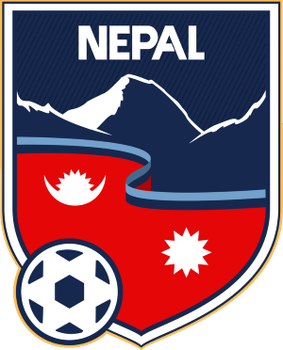
The Nepal national football team represents Nepal in International men's football, and is governed by the All Nepal Football Association (ANFA). A member of the Asian Football Confederation (AFC), the Nepali football team plays their home games at Dasharath Stadium in Kathmandu.

Gangtok is the capital and the most populous city of the Indian state of Sikkim. The seat of eponymous district, Gangtok is in the eastern Himalayan range, at an elevation of 1,650 m (5,410 ft). The city's population of 100,000 consists of the three Sikkimese ethnicities the Bhutias, Lepchas, Gorkhalis and also plainsmen from other states of India have settled here. Within the higher peaks of the Himalayas and with a year-round mild temperate climate, Gangtok is at the centre of Sikkim's tourism industry.
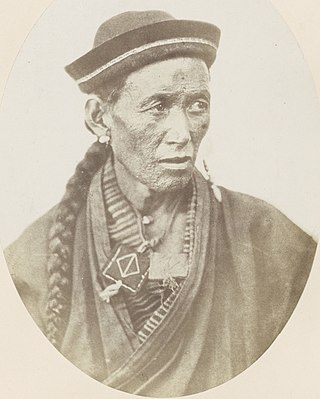
The Bhutia are a community of Sikkimese people living in the state of Sikkim in northeastern India, who speak Drenjongke or Sikkimese, a Tibetic language fairly mutually intelligible with standard Tibetan. In 2001, the Bhutia numbered around 60,300. Bhutia here refers to people of Tibetic ancestry.

Danny Denzongpa is an Indian actor, singer, and film director who primarily works in Hindi and occasionally in Bengali, Nepali, and Tamil films. In a career spanning five decades, has acted in over 190 films since 1971. In 2003, Denzongpa was awarded the Padma Shri, India's fourth-highest civilian honour.
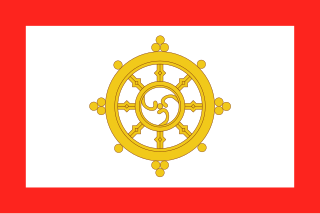
Sikkimese are people who inhabit the Indian state of Sikkim. The dominance ethnic diversity of Sikkim is represented by 'Lho-Mon-Tsong-Tsum' that identifies origin of three races since seventeenth century. The term 'Lho' refers to Bhutias (Lhopo) means south who migrated from Southern Tibet, the term 'Mon' refers to Lepchas (Rong) lived in lower Eastern Himalayas and the term 'Tsong' refers to Limbus, another tribe of Sikkim. The pre-theocratic phase of Sikkim was inhabited by the Kiratis, “Sikkim is also known as the home of the Kirati tribesmen from the pre-historic times.Society in Sikkim is characterised by multiple ethnicity and possesses attributes of a plural society. The present population of Sikkim is composed of different races and ethnic groups, viz., the Lepchas, the Bhutias, the Nepalis and the Plainsmen, who came and settled in different phases of history. The historic 8 May agreement between Chogyal, Government of India and political parties of Sikkim defines Sikkimese as Sikkimese of Bhutia-Lepcha origin or Sikkimese of Nepali origin including Tsongs and Schedule castes. The community in Sikkim is inclusive of three sub-cultural sectors: the Kiratis, the Newaris and the Indian Gorkhas.
The indigenous people of Sikkim are the Lepchas; the naturalized ethnic populations of Limbus, Bhutias, Kiratis, immigrants such as Indian Gorkha of Nepalese descendants who have an enduring presence in shaping the history of modern Sikkim. The indigeneity criteria for including all peoples of Sikkim and Darjeeling hills is a misnomer as it is clearly known that Lepchas are the first people who trace their origin and culture of their ethnogenesis to the historical and somewhat political geography of Sikkim history as is well documented by colonial and immigrant settler history. However many tribes preceded the migration of the colonial powers and can trace their migratory background as well as ancestral heritage and a well formed history of civilization and cultural locus that is not inherently indigenous to Sikkim.

Sushma Joshi is a Nepali writer, filmmaker based in Kathmandu, Nepal. Her fiction and non-fiction deal with Nepal's civil conflict, as well as stories of globalization, migration and diaspora.

Kabaddi Kabaddi is a 2015 Nepali romantic comedy film directed by Ram Babu Gurung. The film stars Dayahang Rai, Saugat Malla and Rishma Gurung. It is a sequel to the 2014 film Kabaddi. It was one of the highest-grossing films in Nepal at the time of its release. It was followed by a sequel named Kabaddi Kabaddi Kabaddi. The final sequel, Kabaddi 4: The Final Match, was released on 27 May 2022.
Sonam Bhutia is an Indian professional footballer who plays as a midfielder for Machhindra FC in the Martyr's Memorial A-Division League.
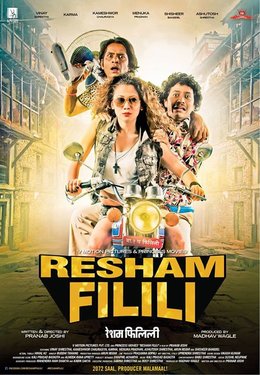
Resham Filili is a Nepali movie which follows the friendship, dreams, hopes and deeds of Resham and Hariya - both whethered by bad luck and misfortunes, must at any cost beat the oddest odds to save their lives from Dorje's men.
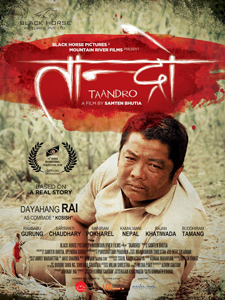
Taandro is a 2016 Nepali language film directed by Samten Bhutia and produced by Satish Kumar Gautam. The film is based on the book Smriti Ka Dobharu written by Ganga Bahadur Lama. The story of the film is based on the confrontation between the Government of Nepal and the Maoists followed by the civil rights movement which came to an end after the overthrow of the Nepalese Monarchy and establishment of a People's Republic. This film was selected for the 19th International Film Festival in Dhaka.

Gyanendra Deuja is a Nepali film director and screenwriter. He directed his first movie, Rakshak, in 1997. It contained the first instance of an underwater action scene in a Nepali movie. He then started adding a novelty to each of his movies. One of his notable movies is Muna Madan based on the long poem of the same name by Laxmi Prasad Devkota. This movie was Nepal's submission for Best Foreign Language Film at the 2004 Oscars. As of May 2016, he was shooting his latest film, Buddha - born in Nepal, which is a story of a struggling Nepali student In America.

Anaagat is a 2019 Nepali language psychological thriller directed by Samten Bhutia and produced by Mountain River Films and Tiny but Big Pictures Production. The seed for the film was sown when Chandra K. Jha, who went on to become one of the producers of the film, pitched his story idea to Samten Bhutia. In subsequent meetings between the two of them and Prabachan Shrestha, the screenwriter, the story took shape quickly and a full-fledged screenplay followed soon after. Even at this early stage, there was a unanimous opinion that the leading roles of Kriti and Suresh should be played by actors Priyanka Karki and Arpan Thapa, respectively. When the story was pitched to the actors, they immediately agreed to come on board.
Sikkim Gorkha Jagaran Sangh is a non-government state-level organization of Gorkha ethnic group of Sikkim.
Jhumkee features suspense story on Women Violence in Nepal.

Surya Kumar Neupane known professionally as Uttam Neupane, is a Nepali sound mixer. He is the recipient of the 5th National Film Award of Nepal for Best Sound mixing for the feature film Mero Euta Saathi Chha. Two films he did sound-mixing for, Bulbul and Talakjung vs Tulke, were Nepal's official entries for the 92nd and 88th Academy Awards respectively.

Peter John Karthak was a Nepalese writer, musician and journalist. He wrote two novels, several poems and short stories and edited and wrote for multiple newspapers in his life. He is best known for his Sajha Puraskar–winning novel, Pratyek Thau: Pratyek Manchhe.
References
- ↑ "Samten Bhutia's 'Taandro' in Dhaka film fest | Entertainment | Nelive". Nelive.in. 30 September 2015. Retrieved 25 February 2016.
- ↑ "Samten Bhutia". IMDb.com. Retrieved 25 February 2016.
- ↑ "Peoples Review Weekly – Taandro competing at Dhaka International Film Festival". Peoplesreview.com.np. 13 January 2016. Archived from the original on 4 March 2016. Retrieved 25 February 2016.
- ↑ "Samten Bhutia comes with a nepali film "Letter" ~ Proud to be a Sikkimese". Sikhim.blogspot.com. 21 October 2010. Retrieved 25 February 2016.
- ↑ "samten bhutia's blog". Filmfestivals.com. Retrieved 25 February 2016.
- 1 2 "The Telegraph – Calcutta : North Bengal & Sikkim". Telegraphindia.com. 24 June 2005. Archived from the original on 2 March 2011. Retrieved 25 February 2016.
- ↑ "In Search of Nation (2013)". IMDb.com. Retrieved 25 February 2016.